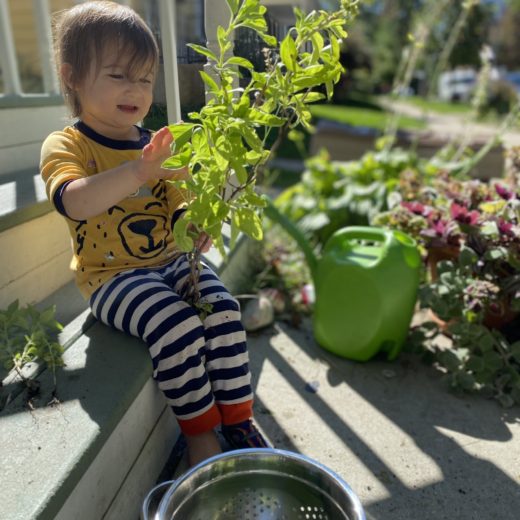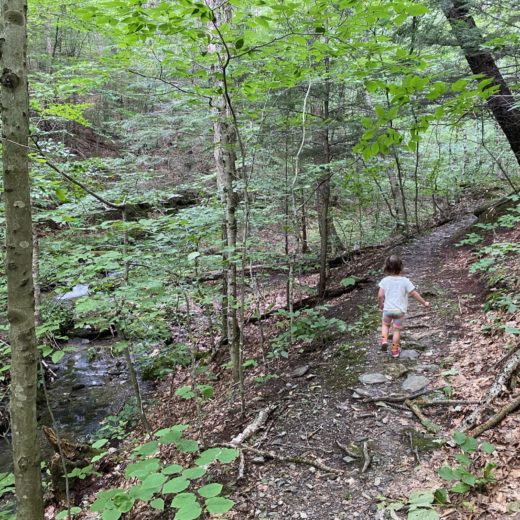In a time of a global uncertainty, increased screen time, online learning, overpacked schedules, and constant pressure for productivity, it is no surprise we have seen significant increases in mental health challenges across the board, and specifically with children. We also face a secondary obstacle: access to services and resources for families and children. There’s been a significant increase in mental health disorders without a corresponding increase in quality and affordable care. Families looking for mental health care find therapist caseloads maxed out and do not know where to turn. In comes nature! Research about nature’s health benefits has exploded in recent years. As Florence Williams describes in her book, The Nature Fix, nature makes us happier, healthier and more creative. Something us nature lovers always understood, felt, and embodied, now has the research to support it. Nature is the wellness tool accessible to every family – without the wait list!
How we became removed from nature
We humans have lived in nature and with nature for 99.9% of our time on earth. Our ancestors’ bodies adapted to regular interaction with nature, and our modern-day bodies still depend on it. So, if nature is so important to our well-being, why have we shifted away from it?
The invention of machines that could make fabric, the use of steam and other new kinds of power, and a host of other developments transformed society during the Industrial Revolution, starting about 260 years ago. Demand increased for quick production of goods that could supply a growing population. Many started moving to the cities to work in factories. As a result, we started to find ourselves far removed from nature. During this time, we began to look at nature as a resource, something we can take and benefit from. We lost our historical relationship of reciprocity with nature. Simply put, nature became a commodity.
Of course, the Industrial Revolution produced many gains. The technological and scientific advancements of modern times helped us live longer, and improved our quality of life in many ways. However, our relationship with nature was compromised.
During the last few decades, our separation from nature has intensified. Children stopped spending the majority of their recreation time outside. Instead, they started spending more and more time with electronic devices which had a big impact on their mental and physical health.
In 2005, Richard Louv introduced the term, “nature-deficit disorder” in his book Last Child in the Woods. “Nature deficit-disorder” refers to the negative impact of human alienation from nature, specifically on children. The term, nature-deficit disorder, does not represent a clinical diagnosis but rather a call to action. Louv created this phrase to inspire change on all levels, from policy and urban development, to schools and wellness programs.
Why we need nature
Way before modern medicine and therapies, there was nature. Clearly something was working. Humans survived and thrived with nature for thousands of years. In the late 20th Century, scientists began to define and study the idea that humans have a natural need and desire to live with nature.
In 1973, social psychologist Erich Fromm coined the term “biophilia,” to describe, “the passionate love of life and all that is alive.” In 2005, Edward O. Wilson, a Harvard entomologist popularized the term to further the idea that humans have an innate affinity for the natural world. Later on, environmental psychologists used the concept of biophilia when developing theories about stress reduction and the restorative influences of nature.
Researchers in Japan found that time spent in nature has not only psychological benefits but physiological benefits as well. Read about some of the known benefits of spending time in nature below:

Physiological Health Benefits
- Increases calcium uptake
- Improves diet (Kids who garden eat more vegetables.)
- Strengthens immune system (Kids who play outside have stronger immune systems.)
- Increases physical activity
- Reduces risk of obesity
- Lowers systolic blood pressure
- Nature exposure for mothers can promote better fetal growth and healthier birth weights
- Time spent in bright sunlight can reduce nearsightedness and increase Vitamin D levels
Psychological/ Social-Emotional Benefits
- Stronger emotional connections to people and nature
- Pro-environmental behaviors
- Reduces stress, anger, anxiety and depression
- Improves mood states
- Promotes attention restoration
- Increases social skills
- Increases self-esteem
- Improves body image
Academic Benefits
- Boosts performance in reading, writing, math, science, and social studies
- Increases impulse control
- Enhances creativity, critical thinking, and problem solving
- Increases focus and attention
- Decreases ADHD symptoms
- Increases enthusiasm for and engagement with learning
- Decreases disruptive behaviors
- Nature-based learning is associated with reduced aggression and fewer discipline problems
Spiritual Benefits
- Gives children a sense of peace and oneness with the world
- Sparks creativity and imagination
- Inspires connections with the wider world
- Increases a sense of wonder
- Encourages reflection
- Quiets the mind
Why nature needs humans… especially children
Children need nature and nature needs children. Encouraging our children to live with nature not only benefits our children’s health and well-being. When children understand and experience how much nature is critical in our lives, they are more willing to protect nature for future generations. As Jacques Yves Cousteau, the French scientist and explorer, so eloquently stated, “People protect what they love.”
This fall, take advantage of the cooler weather, and consider spending more family time in nature. Model the healthy habits you want to teach your children. Disconnect from your devices and go out and explore! Notice how you and your family feel while you are outside… and afterwards. Encourage your children to notice any differences in how they feel too. Then talk about nature as a family, so the lessons can sink in. If you want to learn more about ways you and your family can spend more time outside, or how you can help your family cultivate a healthy relationship with nature, review the ideas and additional resources below.

Ideas for Spending Time in Nature
Pima County Trails – free to explore!
Create an outdoor scavenger hunt
10 ideas to inspire time in nature during the coronavirus pandemic
Other Nature Resources to Explore
Childhood By Nature: Information and activities for getting kids back into nature.
Park Rx America: A resource for health care professionals who want to prescribe nature to their patients/clients.
The Children & Nature Network: Provides information and resources about some of the psychological and physiological benefits of nature for children.
Be sure to keep your eye out for next month’s blog about forest therapy, and ways you can experience nature like never before! At Intuition Wellness Center, we specialize in health and wellness services for children, young adults, and their families. If you think you would like some extra support, we’re here for you.
Written by: Gabe Rischall, LCSW, RPT, ANFT guide in training



1 thought on “Nature’s Benefits: Accessible Wellness for Every Family”
This is such a great article! It’s wonderful that there is research backing up the amazing benefits of nature! I’m excited to learn more about this program.